You are currently browsing the category archive for the ‘Orthodox Saints and Church Fathers’ category.

Newsletter N 1. January 1970
New Year sermon, 31 December 1969
In the Name of the Father, the Son and the Holy Ghost.
Once again a new year is approaching. When we are young we greet the new year with open hearts and it seems to us that everything is possible in it. It stretches before us like an endless plain of virgin snow; no footprint has yet marked the whiteness. Everything is possible, everything is pure and shining. In declining years we await the new year with a kind of inner patience, we feel that it will be a repetition of the past. There may be new events in plenty but they will be familiar, earthly happenings which we know how to live with. In both cases we are mistaken. Yes, the new year lies before us like a path that no one has yet trodden, a clear, virgin plain that must flower with a wealth of human good deeds. Whatever our age a path lies ahead of us and it is up to us to make it the way of the Lord, or not. It depends on us whether for those around us and for future generations we make a track to Heaven or to Hell, either eternal Hell, or simply the cruel human hell on earth. And at the same time what lies before us is, as old age sees it, the usual and familiar, only that it has never happened to us before. Life may be as ordinary as ever, but we may be different, the same events may occur again but be quite new because we have changed.
We can enter this year creatively, but only on condition that we enter with hope, that is with the certainty that the Lord is in this year, that He is the master and will lead us to the right place, and with the faith that nothing in this year will happen without the will or acquiescence of God. If this is our attitude we shall see that nothing is chance, (whoever believes in chance does not believe in God) that there are no pointless meetings and every person is sent us by the Lord. And if we enter this year with the knowledge that everything — light and dark, good and terrifying — is a gift of God and is sent us so that through us faith, hope, love, joy and the strength of the Lord should enter the world, if we firmly believe that every person who crosses our path is sent in order that we may bring him the word or action of the Lord or receive it from him, life will be meaningful and rich. Otherwise it will remain a matter of chance, an endless string of fortuitous events. Let us enter upon the new year with this faith and hope and this burning of the spirit, let us receive each other and anyone whom God may send us as the Lord receives us on our way, and let us accept anything that befalls us as coming from the hand of God, and in all circumstances let us be Christ’s; then all will be well.
The year has passed and many are now seeing the new year in the Kingdom of God. They have run their course; we are still on earth. Let us remember those who lived among us, those whom we knew and loved, and those whom we barely noticed through inattentiveness. Let us remember them now at the throne of God; let us remember all those countless people who perished miserably this year from illness, in accidents, in war. Let us remember everyone and leave out no one, and enter into this new year with a heart open to all. And before we separate, let us sing ‘eternal memory’ to all the departed, and let us keep that eternal memory in our hearts with love and thanksgiving to God that He let us meet people whom we could love and respect and whose example could inspire us. (Choir: eternal memory) May God bless the new year: I wish you a happy new year, to live, to love God, to love people and to serve them.


We are on the threshold of the Holy and Great Lent. This Sunday of the expulsion of Adam from Paradise as the last rest before our spiritual struggle, places us at the beginning of our sinful life on earth. We are banished from Heaven because of disobedience, pride and non-abstinence. A life on earth full of struggle, suffering, tears and death, is our “reward” for sin.
The state of Adam banished from paradise, which is also our state, is reflected in the humble hymns of this Sunday: “Standing Adam at the gate of Eden, wiping for his nakedness and moaning:
Woe to me, that I disobeyed Your good commandment and being stripped of Your glory, alas, with shame I am laden. Woe to me, naked of my innocence and left in poverty. Now oh Eden, I will not delight in your sweetness…”
So, the struggles, the sorrow and wiping of lent are the sorrow and mourning for our lost Heaven, which we ought to regain with much suffering. This Sunday Gospel reminds us again of the two great deeds: humility and love, which are the basis of all good deeds. But fasting together with prayer and struggle can be thwarted by the enemy if we are not attentive. Therefore our Savior teaches us: “And when you fast, do not look dismal, like the hypocrites, for they disfigure their faces that their fasting may be seen by men. […] But when you fast, anoint your head and wash your face, that your fasting may not be seen by men but by your Father.” (Matthew 6: 16-18).
Let’s not forget the lesson from the parable of the Publican and Pharisee when we fast. Lets struggles with love but guard our work and keep it silent. Let the withering of our body be clothed in the gladness of our heart, thinking about the great benefit that fasting brings. The anointing of our head and the washing of our face should not be taken literally, but in a spiritual sense. Saint Maximus the Confessor tells us that the face is the icon of our entire live, and the head is the symbol of the mind (see Philokalia). So the washing of the face means to cleanse our lives from all defilement of sin, and to anointing of the head means to acquire a mind full of divine knowledge.
Worldly cares usually occupy all of our time and there is no respite to care for the soul. But the worries should be proportioned to the significance of our labor. As our Savior tells us: “Do not lay up for yourselves treasures on earth, where moth and rust consume and where thieves break in and steal, but lay up for yourselves treasures in heaven […] For where your treasure is, there will your heart be also.” (Matthew 6: 19-21).
These earthly possessions compared to the one expensive treasure – our soul, do not deserve the attention they are given. We cannot ignore the bodily careless, but the caring for the soul should come first, so this Lenten journey, a time of weariness and cleansing of soul, should not be spent in many of the worldly cares.
In particularly, The Holy Gospel draws our attention to the love of neighbor, namely the forgiveness of our neighbor as a great deed, well pleasing to God. So much our Savior stresses the forgiveness of our neighbor that without it, He does not forgive our sins: “If you forgive men their trespasses, your heavenly Father also will forgive you; but if you do not forgive men their trespasses, neither will your Father forgive your trespasses.” (Matthew 6: 14-15)

While all sin is directed against God and only from Him we can obtain forgiveness, however, of the sin against our neighbor God does not forgive us without his/her approval. Therefore, when we ask someone forgiveness that we offended him, he replies: “May God forgive you! ” Meaning: I ‘ve forgiven you, so the Lord God will forgive you. And that is how God forgives us.
First we need forgiveness from God for the renewal of our mind and our labor during this lent will follow this path. So in our daily Prayer to our Lord, we commit before God: “Forgive us Lord, our sins, as we forgive our debtors.” Without this forgiveness, God does not forgive us. Not only that He doesn’t forgive us, but He also will not receive our good deeds. This is told clearly by our Saviour: “Therefore if you bring your gift to the altar, and there remember that your brother halt aught against you, leave there you gift before the altar, and go your way; first be reconciled to your brother, and then come and offer you gift.” (Matthew 5: 23-24)
Elder Petroniu Tanase of the Mt Athos


On January 7, the Orthodox Church [new claendar] celebrates the Synaxis of John the Baptist and the translation of his right hand from Antioch to Constantinople. According to the Church’ tradition, John the Forerunner of our Lord, was buried in the city of Sebaste, Samaria. Saint Luke the Evangelist wanting to move St John’s whole body to Antioch, was able to obtain and translate only his right hand.
Historians Theodoret and Rufinus mention that the tomb of St. John the Baptist was desecrated in 362, during the Emperor Julian the Apostate reign, and a part of St. John relics burned. What remained intact from Saint’ body was taken to Jerusalem, then to Alexandria, and on May 27, 395 was placed in the church that bears saint John’ name.
The chronicle of John Skylitzes (a Byzantine historian of the eleventh century) states that the right hand of St. John the Baptist was moved from Antioch to Constantinople in 956 by Emperor Constantine the VII or Porphyrogenites (913-959) to be placed in one of the chapels of the Grand Palais, that is in the church of the Most Holy Theotokos of Peribleptos.

At the end of the twelve century, the Russian archbishop Anthony of Novgorod who went on a pilgrimage to Constantinople, mentions in his writings among other treasures of this church, the right hand of St. John the Baptist.
According to Du Cange in 1263, Othon of Ciconia attested the presence of a small piece from St. John’ right hand, in Citeaux Abbey, France. In 1261, Othon aceepted the refuge of the Latin Emperor of Constantinople Baldwin the II and in exchange for a gift, the emperor gave Othon this piece of relic of St John.
In a testimony of the Spanish ambassador Clavijo dated 1404, it is mentioned that the holy hand was still in the church of the Theotokos – Peribleptos in Constantinople. After the fall of Constantinople (in 1453), the hand of St. John the Baptist along with other Church’ treasures were seized by the Turks and kept in the imperial treasury.
In some Turkish fiscal archives from 1484 kept in Topkapi, it is noted that Sultan Bayezid the II (1481-1512) sent the hand of St. John to Hospitallers from Rhodes, (who occupied this island during the first quarter of the fourteenth century), in order to earn their favor. Later, the Hospitallers took the relics to the island of Malta, where they established their qurter.
In 1799, St. John’ hand was translated from Malta to Gatchina (Russia) when the Russian Emperor Paul the I (1796-1801) became the Grand Master of the Order of Malta, but also due to threats of war from Napoleon. This event is also mentioned in the Russian sinaxaryum, from October 12. From 1799, the relics stayed in the possetion of the Russian tsars, but in 1917, they were taken out of the country by Maria Feodorovna, fearing the anger of the Bolsheviks. Since 1917, the right hand of John the Baptist was preserved in Germany, then in Yugoslavia and presently is found in the Monastery Church of Cetinje from Montenegro.

In June 2006, during a two weeks period, the right hand of St. John the Baptist returned in procesion to Russia. Hundreds of thousands of pilgrims venerated the holy relics in the cathedral dedicated to our Savior from Moscow. After Moscow and Nizhny Novgorod, the holy relics were brought for veneration to Yekaterinburg, Rostov, Minsk, Saint-Petersburg and Kiev(Ukraine). On July 16, the holy relics of St. John returned to Montenegro.

However, it seems that part of the right hand of St. John offered by Sultan Baizid the II to the Order of Hospitallers, returned to the Ottoman Turks in the late sixteenth century. This piece is currently preserved in Topkapi [Palace] museum, in Istanbul.

It is surprising to find Christian sacred relics in the possession of a sultan… Pehaps because in the Qur’an, St. John the Baptist is called Yahya, the profet that precedes Isa (Jesus).

The holy relics, as they are preserved today, are placed in a medieval metal ouches [case], modeled in the shape of an arm with realistic artistical accents. This ouches is undoubtedly the work of a Venetian workshop, as the case is inscripted with two silver marks: one representing the Venetian lion and the 2nd mark is a Maltese Cross – sixteenth century style, the era when the Order of Hospitallers became the Knights of Malta.


The finger gesture is a sign of blessing – commonly found in the Byzantine art, but also a gesture by which Saint John points at Christ as “the Lamb of God”. The ouche bares three inscriptions: one around the wrist noting: “the hand of John the Baptist”, a second on the index finger, referring to the sermon of St. John depicting Christ as the Messiah: “Behold, the Lamb of God”, and a third inscription located on the elbow which mentions the name of a certain monk: “A prayer of God’s servant Daniel.”

Small pieces from the right hand of St. John are also found in the Monastery of Dionysiou from Mount Athos,

and the Coptic Monastery of Saint Macarius the Great from Sketis, Egypt.
.jpg)
Source: crestinortodox.ro
Winter holidays in the midst of Arab Spring

“Christ is born, glorify Him… sing unto the Lord all the earth and joyfully praise Him all ye nations for He is glorified!”
It’s the liturgical song that expresses the joy of the Church that our Christ Savior was born. The joy that unites heaven and earth, angels and men. A joy that we all felt and we mostly lived it liturgically, ecclesiastically, Eucharistically – in the great mystery of the Divine Liturgy. We could say that is something normal and that is how our ancestors lived. In our nation, yes, it’s normal. But unfortunately not all Christians had the holy peace that we’ve all enjoyed at Christmas.
Every time the Gospel is read, on the Sunday after the Nativity of our Lord, we are presented with a family [the Holy family of the Virgin Mary and righteous Joseph] in the Middle East, fleeing [with the baby Jesus] from the human hatred [of Herod]. From infancy, the Holy Child experienced suffering. From the cradle, He began to bear His Cross. But He wasn’t alone… Immediately it followed the 14,000 innocents, the first martyrs of the Church – the infants. And the series of this genocide continues until today…
This Christmas feast, in the home’ land of the Christ Child, in the Middle East, Christians celebrated it – with tears. Tears for the loved ones who have died, tears for the many which cannot be found, tears for their churches and their cemeteries, tears that Christ was born in a world too cruel.
Tears began to flow starting with the eve of the great feast, while in our country, children brought the good news. On December 24, 2013 during Vespers in the Dora neighborhood of Baghdad, a church was mined. 26 Christians that were praying in the church have died and 38 were injured. At the same time, in the Athorien plaza of the same city, two bombs targeted a cafe owned by a Christian family. 11 more dead and 21 wounded were added to those murdered in the church.
In Egypt, a little after midnight on December 26, during the Divine Liturgy, a bomb exploded in the nave of the Coptic church: Abba Anthony. There, 23 martyrs were counted and about a hundred were injured. According to the eyewitnesses, “there were body parts [of those martyred] spread everywhere, on the streets, outside the church and even in the Holy Altar. The dead were placed before the altar, covered with newspapers and the vigil continued… ” The eyewitnesses also attested that “the security forces withdrew an hour before the bombing of the church.”
These may seem to us like events from a parallel world. But in fact they were acts of ordinary Muslims, trained by a series of fanatical clerics. And if they were attributed to the rebels, we must say that there were also government orders. In most Arab countries, the Muslim government leaders have passed law bills that prohibit Christian liturgical worship during the period of December 6, 2013 to January 7, 2014.

In the Islamic Republic of Iran, a government decision was instituted that ‘recommends’: “the local Christian churches to reduce the pomp for the celebrations of Christmas and New Year, in order not to disturb the days of mourning and self-flagellation of the Shiite Muslims.”
In Iraq, some teachers from the elementary schools in Baghdad and Mosul have scheduled final exams on December 25, forcing Christian students to attend school on the day of the Nativity. Some Muslim clerics in their sermons insisted that to tell someone Merry Christmas is worse than fornication . . . and even worse than murder!
At home, we enjoyed the caroling, the lights and the Christmas tree, we attended church and we extended this joy into our family homes. With or without the snow we felt it as a magic winter. We lived the holidays, as we desired.
In the Middle East however, the winter continued with the Arab Spring, which brought tears and pain. But Christ was also born for them. Perhaps more than He was for us! That He may bring comfort to their souls. There, were the carols were absent, the holy angels sang instead: “Christ is born, glorify Him … sing the Lord all ye nations and joyfully praise Him, for He is glorified!”
“Copyright Disclaimer Under Section 107 of the Copyright Act 1976, allowance is made for “fair use” for purposes such as criticism, comment, news reporting, teaching, scholarship, and research. Fair use is a use permitted by copyright statute that might otherwise be infringing. Non-profit, educational or personal use tips the balance in favor of fair use.”
Motto: “For me, the life of my brethren is more precious than my own life.”
We cannot acquire the image of Christ within us unless we are truly [united] one, as Christ asked His disciples: Love one another, so that the world may know that you belong to Christ (John 15, 12).
For me, the life of my brethren is more precious than my own. When you will understand this, there will be no more misunderstandings between you. The untying of a problem or a disagreement, does not depend on any organization, or a particular code of conduct, but on the decision to bear everything. Each one of us must have a mother’ heart for others.
We ought to be very sensitive to the needs of others. Then we’ll be one and the blessing of God will abound in us.
We must have Christ’ consciousness, Who bears in Him the whole world; therein lies the universality of the human being. The Word of Christ does not change, and it is eternal.
If we confess in the Creed that Christ is the One True God, the Savior of the world, its Creator through Whom all things were made, how can we reduce our faith to a matter of nationality, place, or time…?
(Archimandrite Sophrony of Essex, in “The Life in the Spirit”
From the beginning I would like to ask: do we all feel in good standing for this Christmas celebration? Are we all at peace with each other? Do we welcome this festival – so to say – naturally or are we at unrest or hide anxiety, stress or worries within?
If someone would walk through the city streets, the markets and see how people rush here and there, to finish shopping, could say: “How unhappy are these people and how they should otherwise feel, as they find themselves worry on all these things? How unfortunate they are!
How can someone welcome Christmas and celebrate it, I mean every day? As I said today at the Holy Liturgy, we do not only wait for Christmas, but we live it even now. On Christmas day Christ was born. So this fact that Christ was born does not only include the entire time or our whole life, but encompasses eternity, it embraces everything. Therefore, everywhere and every day is Christmas.
Christmas is not a static day enclosed in time as something “magic: as soon as that day comes, we enter in.” Because that day will come and go like any other, unless we are truly prepared for it. And we are prepared when these very days we celebrate, leaven within us and help us. Therefore, what kind of Christmas will someone celebrate when he is not in order, when his soul does not rest in God, when agitation, restlessness, emptiness, hopelessness, or despair rest within? Our whole life in this world lays on hope. Man’ existence is one full of hope. If someone misses this, what can Christmas do for him? If someone doesn’t live this belief, can Christmas mean anything? If they do not have the fullness of God within their soul, can Christmas do something for them?
But what makes man be in good standing? So this question whether are we ready for Christmas, I ask again as we move closer to the feast, to free us from worries and anxieties. Man is not in order when he tries to ignore – as some try to simply forget – nor when he seeks justification or excuses. The one thing that puts man in order, the thing in which man finds rest, is repentance; to repent before God, to humble himself before God, to return wholeheartedly to God. Without repentance there is no Christmas. No matter the circumstances at home, repent before God and before your brothers.
This of course involves the love for God and the love of neighbor. Mo matter how [difficult] things are… For love creates a different atmosphere, another state, then people can truly come together to celebrate Christmas. But I mean true repentance! Again, repentance is not to forget certain things. As sometimes when someone in a certain place feels exposed, he remembers facts, conditions, things that humiliate and grieve him, so he wants to move to another place hoping that he will be placed in order. This is flying from temptations. Of course, sometimes this could be good, if there is no other choice, or because man has no courage to do otherwise, however this does not bring healing. That one thing that man needs, the thing that really helps with his healing is to repent before God for all that he did, for all that he accused Him for. To repent of every sin before God and sinful as he is, with his ego wounded and exposed, or in whatever sate he may be, to have the courage to stand before God. If you have the courage to stand before God, with your sins …, this means either courage or repentance. And of course, everyone can distinguish between the courage and repentance. Otherwise if man conceals his sins, he will hide his true self and will try to appear before God completely innocent. In this case, man becomes unconscious of his sins, or more precisely in psychological terms, he reject his sinful passions in his sub consciousness then he’ll appears before God somewhat repentant, somewhat in order, somehow humble, somewhat upright, [thinking that] perhaps this is how God wants him to be. However, this does not mean putting oneself in order.
Repentance is not as easy as we may think. And please take heed of this. […]
And I would say that repentance is a blessing from God. If God does not give you His grace to repent, you cannot repent. Therefore man must not take repentance at ease. We mentioned another time, what it is written in the Apocalypse (Revelation): There were [will be] disasters, terrible things [will] happened, cities [will be] destroyed, many [will] perished, and yet “people did not repent of their wickedness”. They still did not return to God. And another evil came upon them, another plague, and they still did not repent. And this is written, a second and a third time.
We not certain whether man [humanity] will repent, even when man is going through difficult times, it may only seem that he repents. This kind of repentance that occurs in a forceful way, let’s say in a moment where you are at limit, it is not true repentance; that there is an earthquake or the world comes to its end, and you’re ready to repent… Or the war is imminent, or your life is in danger, so you repent. Such repentance does not hold. For man forsook God, then God abandons man, and man remains unrepentant and although he sees, he hears, he does not intend to return to God in repentance for God to heal him and save his soul.
Repentance is a great wonder. For this we say “Lord Jesus Christ, have mercy on me, a sinner.” This prayer is a work of repentance. I mean that you repent when you ask for His grace, His forgiveness, but also you ask for repentance. It’s like asking repentance when you say: ” Lord Jesus Christ, have mercy on me.” He who asks repentance, unceasingly says: “Lord Jesus Christ, have mercy on me,” and when you neither can, nor that nothing happens to you and you’ll give up, it means that you had no real desire for repentance.
From Simeon Kraiopoulos – “On repentance”
Source: http://paterikakeimena.blogspot.ro/2011/12/blog-post_1903.html
The relics of the saints and their power with Father George Calciu
interviewer:
– The holy relics of the saints are venerated with great devotion by the Romanian faithful. Why is this father? Is it because of some inheritance, or is it perhaps that the people really feel their help?
Father George:
– I remember back, during the days of the communist regime, before my detention, that the holy relics were sought less by the faithful than they are today. The relics are incorrupt bodies of the saints; and there is a whole theory on the incorrupt bodies. Even after death, God will flow a special grace to those who had a higher spiritual life. However, I will not insist on this. What I want to emphasize is that, there is a close connection between the saint’s soul and his/her holy relics that we venerate, and it is proper to honor them. Undoubtedly this thirst for the veneration of the relics of the saints involves a close relationship between the believer who asks and the saint who intercedes for him. I am convinced that every believer realizes that the relics alone don’t bring healings, consolations, or relevance from temptations, but the saint through the grace given to him/her by God, can work wonders through those relics. If there are people who believe otherwise, that the relics do wonders by themselves, and not by God’ grace, it means that they fell into an error near idolatry.
In: – If the saint works through the grace granted to him/her by God, and not by this relics or his icon – sometimes called “wonders working icons” – wouldn’t just be better to pray directly to the saint without having to venerate the relics and the icons?
Fr. G: – There are people who also do that. The prayer is what matters first, but the contact with the holy relics and the icons is also useful. For man needs some steps to his ascent to the spiritual life. Man’s personal relationship with the saint is best established this way. Father Dumitru Staniloae wondered: “How is it that, a million people are praying to a saint, and the saint answers to all of them?” The explanation is that the saints receive from God the gift of listening to a million prayers at the same time, of distinguishing between the prayers and offer help to all. The presence of the relics is for most of us, that certainty that the miracle is possible.
When one sees the incorrupt body of a saint, it means that the saint can come to your help. I’ve noticed that, whether you’re a believer or an atheist, the need for the miracle is as great. For instance in the West, the witches and fortune tellers are in great demand. It is a delusion for us humans, invented by the devil, to satisfy our thirst for the miracle. Perhaps, even here in Romania, there are people who seek the relics, but also the fortune tellers. And this is a forbidden mixture.
In: – Father, but if the people are so attached to the relics of the saints, why most of them rash to bow before the relics only on feast days? Is the grace of the saint grater on that day?
Fr. G: – No, but we relate to certain dates, anniversaries and commemorations. So people think that the power of the saint increases on those occasions. And I believe they’re right, for people’ faith and hope is greater on those days so the saint responds accordingly. When I was a professor at the Theological Seminary, the students took turns guarding the holy relics in our church, to keep orderly those who came to venerate them. One day, a boy who was on duty, which I considered very sincere and humble, and with great faith, came to me and said: “Father, now I believe.” He witnessed a miracle: a paralyzed woman was cured by St. Demetrius the New.
So the miracle is done not only for the one who has been healed, but also for those who are present. Then, the prayers done in communion with each other, during the feast, is more appealing to God than the prayer done alone, as the feasts create a certain spiritual emulation, which the soul is deeply involved in. And surely we’ll receive according to our faith. So people come together and encourage each other in the spirit, for their faith, and for the veneration of the holy relics without being much aware of it. It is very important that people will not make from this a mean of idolatry. They ought not to forget that beyond the holy relics, is the spirit of the saint and especially God who gives His power to the saint and who makes the wonder happens. It is known that a faith that is based solely on miracles, is a weak faith. But many times through the miracle, conversions happen, some of which being very dramatic.
In: – How do we know that we sand before a holy relic?
Fr. G – The holy relics are consecrated by the Church, and this is the proof. The healings or the conversions to the faith are the result of the fact that the relics are enshrined by the Church.
In: – How about if we have the incorrupt remains that are fragrant and even miracle-working from a man who has not been glorified by the Church? … for instance the incorrupt body of Father Elijah (Ilie) Lacatusu from Giulesti that has all the signs of the holy relics, yet Father is not glorified by the Church? Are they holy relics or not?
Fr. G: – There are holy relics if they fulfilled all the canons of the Church and they work wonders. So the finding of the Church is important and this comes with prudence, after checking all the signs. It is not wrong that it happens this way.
In: – Elder Justin Parvu, the Abbot of Petru-Voda Monastery – Neamt [now with the Lord], warned that our country is full of holy relics unrecognized by the Church. And for this, says the holy elder, the wrath of God is upon us. Father Abbot Justin emphasized that, in the mass graves where the bodies of the political prisoners martyred for their faith in Christ, were deposited, such as the Ravine Servants (Rapa Robilor) from Aiud, there exist holy relics. Moreover, the elder collected some of their earthly remains and deposited them into a reliquary inside the monastery church. How are we to relate to these bodily remains of those faithful martyred for their faith in Christ?
Fr. G: – In the Romanian Orthodox Church, the hierarchs have no courage to declare that the remains of the former political prisoners martyred in the communists prisons for Christ, are holy relics. Moreover, in the Patriarchate, there are several files pending decision for glorification (canonization), such as that of Father Elijah (ilie) Lacatusu, which I strongly believe that he is a saint, or that of Valeriu Gafencu’s. And the synod did not give an answer. The majority of the former political prisoners were legionaries, and the hierarchies fear that an action towards a possible glorification can be taken as being political. We need to relate to all these wisely and attentively. If God wills, through His saints, whether unknown or unrecognized officially by the church, He can offer us help.
In: – I noticed that in Bucharest, there are many churches that bear pieces of relics of the same saint. How is it that several churches can get holy relics of one saint?
Fr. G: – In general, those who are in custody of the saint’ body, when a church requests a piece, they can offer. And it happens that the priests, when they learn that a certain church has acquired the relics of a particular saint, will try to get a piece. Some relics were purchased and deposited in certain churches. But if the whole body remains incorrupt, generally is been stored as such. The body of St. Nektarios was maintained whole and incorrupt for 20 years, after which the flesh was gone and only the skeleton remained. Those who were in the care of the saint’ body, shared parts of his relics. His bodily corruption sparked some deceptions; there were people who thought that God has lifted his holiness. The priests however, have agreed that God has appointed this way, that pieces form Saint Nektarios’ body may be shared with the world, and by divine grace, to perform miracles.
In: – Isn’t there a danger, to “trade” with the holy relics?
Fr. G: – Well, even the saints are at risk of our trifles… (Father George smiles). I personally believe that, maybe the saint prayed to the Lord to be “bought” in small pieces by certain places (churches) where people need him the most.
In: – Someone foreign to the Orthodox faith could consider the sharing of dead bodies, a barbaric ritual, even if they belong to the saints …
Fr. G: – If the body remains in one place, we limit the possibility for a large number of people to experience wonders, help and comfort. Not everyone can travel to pray at the shrine with the holy relics of a certain saint, that can come to their help.
In: – In many churches in Bucharest, the pieces of garments worn by a saint are being venerated almost as much as the holy relics,…
Fr. G: – It is not proper so. I do not mean that those garments are not impregnated with the divine power, but they are not like the relics. I do not think they can heal. At most, they can help a person have a better connection to the saint they belong and with God.
In – A church building, not a community of believers, can it be consider better, stronger, or more helpful to the faithful, if it bares in it sacred relics?
Fr. G: – The saint works in this matter: people themselves are stimulated to come to the church and to believe. But all [Orthodox] Churches are full of grace, and God is everywhere, not just where the relics are present. Not all the saints become relics. God works through various gifts that He grants to certain people. The relics are only one way of divine manifestation.
In: – Your reverence, do your remember great miracles that impressed masses of people in Romania?
Fr. G – There were many wonders, as the one with my student which I mentioned to you, but they are not being advertised and it is better that way. Thus, we’ll avoid a sort of pride from the churches that bear the holy relics, where miracles happen. If there is too much publicity, and too much fidgeting, it’s not good.
In: – Father, did you experience any miracle?
Fr. G: – Yes once back in 1972 or 1973, I went with my seminary students to St. George Church, where is the hand of St. Nicholas [of Myra]. After all of us passed and bowed before the reliquary, the hand of the saint began to spread a whiff of nice fragrance. Until then, the hand did not smell, and I considered it like a sign from the saint. Maybe it predicted what would happen to me later [father is referring to his second arrest] or maybe it was the saint’ joy that those students were proper to become good priests.
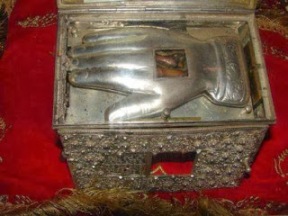
In: – At the end of this interview, for which I thank you father, lets summarize: what does an Orthodox faithful need to know about honoring the holy relics and the veneration of the icons?
Fr. G: – That they are all steps, and only steps in our ascent to God. The Orthodox Christians must not limit themselves to the prayer before the relics or even to the saint invoked in their prayer. The Christian ought to be aware that is God Himself Who works through the saints and responds to our prayers before the icons or the relics. Otherwise we’ll fall closely into idolatry. The danger is very great, especially for the people who are pious, but yet do not have a basic theological understanding of God.
It is almost hallucinatory how Father George exhumation was broadcasted over the local media, TV stations and blogs in Romania. As the events unfolded, upon opening father’ tomb by several monastics during his seven years memorial, we can only say how right was Father George in the statements that he made in his last will, and how the devil can use the spirit of piety manifested upon finding soneone’s incorrupt body, to deceive many.
It’s even more troubling to see, after father passing in the Lord, how the devil continues to fight even with his remaining, trying to stain the memory of a man who sanctified his whole life through many hardships. One can wonder, how is this man pleasing to Christ’s rest now?… when his body became the target of attacks that are foreign to the spirit of Orthodoxy.
And if we understood that someone’ martyrdom happens usually during his life time, in this case Satan is showing a new face, battling in our times even the bodies of those pleasing to God who have stepped into eternity.
Just as Father George once said:
“Between our bodies and our souls, there exist a relationship that it’s never lost. Even if the body returns to earth, this connection between the body and the soul is not disbanded, as something that will be fulfilled at the last judgment. “
And despite the hate that the devil manifests towards those pleasing to Christ, I believe that Father George who was tested in the fire of communist prisons, will come out victorious once again from this battle, after his falling asleep.
And if the Lord allowed this to happen, may it be towards a greater glory to him. May it be that the machinations that took place at the uncovering of Father George relics, will strengthen our prayers and bring us even more in the communion with Father, and with all the saints pleasing to God, part of His Triumphant Church.
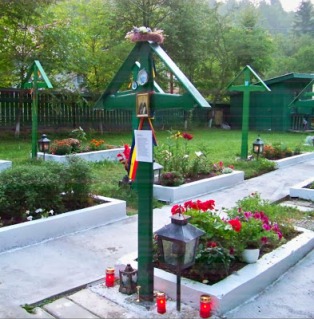
Father George passed on November 21, 2006. According to his last wish, he was buried in the land that he loved and never forgot, at Petru Voda Monastery, Romania. In his last will father said:
“First, you must know that the Father Abbot of Petru Voda Monastery, Archimandrite Justin Pārvu, offered my wife and I, two near by graves in the monastery cemetery, because as I had lived my life near my wife Adriana, I want to be joined with her after death, as the one who helped me in many difficult circumstances, with a courage that I never suspected at her before. In front of our toms, please place a single stoned cross, barring our names, our date of birth and repose and, a call to those who will visit our tombs to pray for us.
According to the U.S. custom, my body will be deposited in a funeral home that will fulfill the procedures for a reposed body to be transported in Romania.
After the washing of my body by the funeral home, ask an Orthodox priest to wash my flesh with wine and oil, saying the customary prayers of the Church over by body. Then dress me with priestly garments and place on my chest the icon of the Virgin Mary, carved in bone and framed in wood, which was given to me at the hospital in Bucharest by his Beatitude Patriarch Teoctist of Romania, which gave the blessing to do so. In my right hand place the Holy Cross and the prayer rope offered to me by the nuns of Diaconesti Monastery; these I will take with me to the grave ‘
(Father George Calciu’ will, November 12, 2006, Military Hospital in Bucharest).
As if he oversaw what will happen over the years, Fr. George left a very clear and uncontested will:
“I know that my funeral will be surrounded by a certain solemnity, which I do not merit upon death, neither that I deserved it during my life time. People will talk and create legends, but God will distinguish the truth from the legend and will reveal me as been a sinner and an unworthy (…)
I spoke above about that spirit of piety manifested among faithful that can go wrong, and can create false miracles. Therefore, please dear Reverend Father Abbot Justin, find a way to prevent such things: whether you leave a document at the monastery or place it in my coffin. The devil might use this popular piety to prevent my body corruption and then to become the works of error.
If over the years, due to construction needs or for other reasons, my body will be uncovered, and to the astonishment of many, will be found incorrupt, have the priests read prayers over it, for my body to be decomposed into the earthly elements, as not from God was this miracle, but through the deception of the devil.
Let the priests who saw this, be silent, and not speak about this false miracle, and my body be placed in another tomb to be eternally forgotten.”
(Father George Calciu, October 28, 2006, Military Hospital, Bucharest, published in he book “The Life of Father George Calciu, Christiana Press, 2007)
One of the theologian and father’ spiritual child (Lucian Popescu) present at father 7 years memorial at Petru-Voda, wrote:
“I recently learned that the body of Father George was uncovered, that it has the appearance of the relics of the saints, that it is fragrant and it was placed in the Elder Justin Pārvu’ cell!
However, Elder Justin Pārvu, who passed away seven months before Father George’ seven years memorial, instructed that the body of Father George may be unearthed at 7 years. I was aware of this fact, but I’m not in the position to give or find a justification for the decision of Archimandrite Justin. There are spiritual perspectives that are impossible to probe with logic, due to lack of an appropriate forum to judge such.
At this point, I do not know the details of opening Father George’ tomb and I think they are less important. It is something done, which cannot be undone.
The important point is that the testamentary letter that Father George left (see above) can be taken as the equivalent of any righteous attitude before his death, who says with conviction that he is the greatest sinner that ever lived.
And it is also essential that no treasure, if proven to be true, may be misused, wasted, or worse, turned into a scandal.
For father George was right when he said that the spirit of popular piety can wander in error and this kind of mistake is still an error…
A lot has been said when Father Calcium fell asleep, but even more now, after the discovering his relics, due to the fact that Father, wrote in his will addressed to Abbot Justin of Petru Voda Monastery, the following:
“If over the years, due to construction needs or for other reasons, my body will be uncovered, and to the astonishment of many, will be found incorrupt, have the priests read prayers over it, for my body to be decomposed into the earthy elements, as not from God was this miracle, but through the deception of the devil.
Let the priests who saw this, be silent, and not speak about this false miracle, and my body placed in another tomb to be eternally forgotten.”
As we will see below, in an interview given by Father George in 2006 and in other sources, Fr. George knowing people thirst for the miraculous, whether being believers or atheists, feared that such event will be speculated by the devil who wants to lead many astray, separating them from God. Father didn’t want that after falling asleep, to become a source of stumbling error for any of his younger brother, and his body, if found incorrupt, to become a means of idolatry for those weak in faith.
For such reasons, father specified in his will that if his body will be found as such, “to be reburied and forgotten”, and priests be bound “not to ever talk on this.”
Also kindly Father George gave a similar word in his will, if at his funeral or memorial “will come a bishop who would like to talk, let him talk” but “if no bishop will come, no one may give a sermon”. We can understand from this that if during his relics discovery, any priest saw them, they were bound to silence, however “the local bishop or any hierarch” are not under this infringement regarding desire expressed by Father’ will.
It is especially the duty of the local bishop to take a wise decision regarding Father exhumation and the finding of his incorrupt body, as this raises questions in relation to father last’ will, more so because the way it was taken out of the grave. Besides the local bishop, it also the duty of the Synod of the Orthodox Church to speak on the finding of any relics, such as Father’s Elijah Lacatusu and more recently of Father George Calciu. (…)
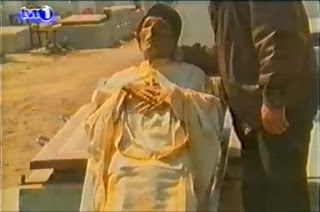
Personally, I believe that Father George Calciu’ wish for his body to be “placed in another tomb to be eternally forgotten”, provides a deep sense of brotherhood with those who also suffered in communist prisons, yet a lot of them having been thrown by the communists into mass unknown graves.
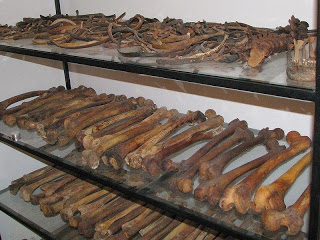
Thinking of them, father didn’t want to be honored by people, while the bodies of his brothers in suffering are still hidden in the womb of the earth. It is a great mystery of God, and this does not diminish at all the holiness of those worthy, although some of them are (yet) unknown to us or without any trace of their earthly remains, while others also God-holy pleasers, have holy relics that can be touched and venerated by the faithful.
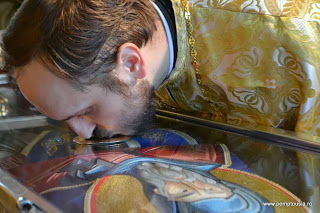
The veneration of the holy icons and the veneration of the relics of the saints must have reference to God, as One Who made them worthy of His grace, and Who comes to our help by His great mercy. Consequently, overlooking or hiding under the veil of forgetfulness, and not honor what was left to us as a bridge to Him, will impoverish our communion with God through the personal connection with His saints.
However we must never lose sight of the wiles of the devil who will use the holy objects to mislead those weak in faith, those whose faith is synonymous to superstition, those who find opportunities to confuse holiness with magic, or those who exult themselves though the grace of the saints. All these and many other falls wonderings the enemy of mankind works, from which one can escape only thorough the power of blessed humility.
May we ask in all things, that the will of God be done first and completely, as we pray that in Father’ case things may happen according to His will. “
Father George’ body that has been taken out of the tomb few weeks ago was re-buried Tuesday, December 9, in another tomb in the Petru-Voda monastery’ cemetery, following the decision of the local Metropolitan of Moldovia and according to Father George’ will.
May his memory be eternal!
Excerpt from the sermon given by Father George Calciu, December 4, 2005 at Holy Cross Orthodox Church, Falls Church, VA
[…] You have heard of weeping icons, of icons that spring mirth or icons that heal. You have heard of saints who have passed and were found incorrupt. You have heard of saints whose bodies although dead, instead of spreading bad odor, spring nice fragrance. You have heard of relics that spring mirth. All these are things that are against nature, but God, in His power make all these happen. How does God work, for a saint’ body not to become corrupt? How does God work for example, for the holy relics to spring forth mirth? How does the saint work the miracle?
The Holy Orthodox Church says that, between our bodies and our souls, it exists a relationship that it’s never lost. Even if the body becomes corrupted, this connection between the body and the soul is not disbanded, as something that will be fulfilled at the last judgment.
At the last judgment we all shall rise again. All the billions of people that ever lived on earth and have died will be resurrected and will have a thinned body, a spiritual body, not a body that is heavy, requiring food and drink, or other things… It will a body that will not suffer if it has done good, or it will otherwise be condemned to hell.
(to be continued)
Father George CALCIU and a Life Sacrificed for Christ

“The only chance of survival for Eastern Christianity
is that of a warfare through the Word.
Our solution is of Calciu-Dumitreasa… “
N. Steinhardt
The future priest George Calciu-Dumitreasa was born in 1925 in Mahmudia, Tulcea, Romania, having been the eleventh child and the youngest of the faithfull parents Dumitru Calciu and Ileana Calciu (former Balan). In his memoirs (and especially in the book „The life of Father George Calciu – after his testimony and those who knew him”, edited by Diaconesti Monastery, Christiana Press, Bucharest, 2007), father George with his humorous style, noted that he learned more practical theology from his peasant mother than from all the treaties and theological schools he attended.
The young George followed the gimnasium in his native village and, then as a high school student in Tulcea, he came in contact with the Legionary Movement and joined, like most young people of his generation, the Fellowships of the Cross (a youth organization of the „legion of the Archangel Michael” intended for high school and junior college students where political views were only secondary, its primary focus was for an education of its memmers in intellectual, national morals, Christian values and brotherhood).
Eager to help the poor peasants among whom he grew up, the young George opts after the baccalaureate for the School of Medicine in Bucharest. When he was arrested in May 1948 he was a medical student in the second year.
Like many young people of his time zealous in faith and with national pathos, members of the Brotherhood of the Cross or perhaps only supporters of the Legionnaire’ cause, the young student George experinced the hell of Piteşti prison. At Piteşti, between the years of 1949 and 1951, under the worst physical and psychological tortures, overcomed by weakness and confusion („they called me the fallen angel with blue eyes” father used to say), he is „recruited” for a short time in the team of the torturers led by the sinister „instructor” Eugen Ţurcanu. Ţurcanu, a diabolical character, was once part of the legionnaire movemet but then recruted by the communist party as a key collaborator in the “Piteşti’ experiment” and lastly eliminated with no scruples by the regime.
However, the young student George Calciu will have a spectacular moral comeback refusing to take part in the Securitate [comunist’ secret service] wicked plan and overturning the trial intended for Ţurcanu and his colaborors; trial by which the comunists were not seeking justice but just to defend their party, through the old method of „finding the scapegoats”.
The young George Calciu finds the courage to point at the real culprits at large: the Secret Service Department of the Communist party founded by Kremlin which planed this odious process of “re-education” by using Ţurcanu and others like him as instruments in trying to promote the falls idea that everything was done by the exiled Legionaries and not by the regime.
With Piteşti, the redeeming odyssey of Paulinic dimentions of young George began, followed until 1963 by inprisomnent in Gherla, Jilava and Aiud and until 1964 by a house arrest in Bărăgan; a George no longer accepting any compromise and determined after his release to sacrifice the rest of his life for Christ and His Church. As I once commented: “This man’s life after the tragic experiment of Piteşti has become one of repentance, confession of faith and sacrifice. […] Perhaps no one after experiencing Piteşti was able to reach such moral comeback, an unrefuted victory over the evil. Because there is the case: George Calciu, it can be said that the Piteşti experiment has failed. Piteşti has physically crushed people, but it could not ultimalety destroy the Man. The greatly tempted George Calciu was not only tring to save himself but he eventually saved the human dignity in the face of what phylosopher Mircea Eliade called the terror of history.”
Having being released in 1964, George finds the strength to rebuild his life and fulfill that exemplary promise; he marries Adriana Dumitreasa (herself with two brothers that had passed through the communist prisons) who gives birth to their only son, Andrew (currently an attorney in Washington DC and father of a son). He is “tolerated” by the Securitate to enrole in the college of Philology and then – with the support of the brave and skilful Patriarch Justinian – in the school of Theology. He teaches French literature for a short period of time, then he is ordained priest and named professor of the New Testament at the Theological Seminary in Bucharest.
After the great earthquake from 1977 (prompted by the demolishion of Enei Church in Bucharest and the communists villain campaign directed by Ceausescu against the holy churches), Father George resumes his open battle with the communist regime and during the Great Lent of year 1978, he starts preaching in Radu Voda Church (then on its front steps when the church officials of the time had tried to stop him by locking the doors of the church) his famous homilies “Seven Words to the Youth,” – a series of sermons calling the youth and especially the future priests, to resistance in the name of Christ and harshly criticizing the atheistic materialism and the insanity of the Ceausescu’ regime.
His sermons had a local and international resonance, especially through the radio station “The Free Europe” but also circulated in typewritten copies, “under hand”, marking destinyes and consciousness.
After many threats, slanders and prosecution (everted also at his family and at his loyal students, so-called “calcişti”) with the intent to stop him, Father George is arrested again (on May 10, 1979), alleged with absurd charges and sentenced to 10 years of inprisonment (later changed to seven and one-half years) of which he executed five years. Father George was released on April 20, 1984 following the international pressures (from the West) directed at the communist regime of Romania.
So Father George Calciu executed a total of 21 years of inprisonment under the communists: 16 years under Gheorghiu-Dej regime (from 1948 to 1964, including one year of house arrest) and 5 years under Ceauşescu regime (from 1979 to1984)!
In 1985, he was practically forced to leave his country along with his family – once again greatly tested. After a brief stop in Western Europe, father moved to the United States – where he was granted “the honorary citizenship”, however with no pecuniary advantage. So practicly father had to start his life over again, working initially as a construction worker – although he’d already reached the age of 60 – to be able to survive and support his family.
Thus, to the 21 years of inprisonment, 21 more years of exile were added.
In America, Father George Calciu continued to endeavored, as much as the Lord strengthen him, to fight the good fight in the name of Christ and his nation. Besides his parish ministry (in Alexandria, VA), he advocated before many international fora in defending many oppressed Romanians; father had also met – among others – with presidents François Mitterrand, Ronald Reagan, as well as King Michael the Ist of Romania; he was a central presence at all important meetings of the diaspora; he published the book “Christ Is Calling You. A Course in Catacomb Pastorship” (St. Herman of Alaska Press, Platina, California, 1997) and much more…
Starting with 1990 after the fall of Communism, father will return every autumn, to visit the home land he had loved and unwillingly abandoned, bringing the same message of unity and forgiveness. In a travel journal from 2003, he noted with tenderness and bitter introspection: “Every year, the spirit of love for my country and its people, its monasteries and their dwellers, for my dear friends and relatives, draws me back to the steps of my childhood and youth and to the joys and sufferings I’ve experinced there – the most precious treasure of those 6 decades of my living in Romania, until the time of my estrangment [exile] 18 years ago. It is like a endless abiss that split my life in two in 1985, deeper and wider than the inprisonment. Maybe because even in prison, my life was following its course on the country soil, and perhaps it is why I always live contemplating my next visit back, passing over an ocean of waters and memories… “
On November 23, 2006, Father George would had turned 81 years. But he passed on November 21 (at 13.10, or 20.10 Romanian time) after 3 days of coma at the Fairfax Hospital, VA brought – at the request of his family – from the Central Military Hospital in Bucharest, where he had spent a prior month and was visited for the last time by many who loved him; by Patriarch Teoctist of Romania and by Metropolitan Bartolomeu Anania – his spiritual instructor who confessed and communed him for the last time.
Departed in the Lord two days before turning 81 years, father was brought back to Romania on the Feast of the Apostole Andrew and laid in the Monastery Church of Radu Voda, where once father delivered the “Seven Words to the Youth.” The official ceremony [memorial service] took place on December 2, and was led by His Beatitude Patriarch Teoctist of Romania in the presence of his Eminence Archbishop Iosif Pop, Bishop Varsanufie Prahoveanul and Bishop Irenaeus Duvlea from America, representing his Eminence Archbishop Nathaniel of OCA. The Patriarch delivered a memorable speech evoking in addition to the theological and spiritual virtues of the newly reposed, father long struggle against the atheist and materialist regime of Romania as well as father “martyrdom in the communist prisons.”
At noon we departed for Petru Voda, father burial place that he had chosen in his will. Thousands of faithful from all over the country and abroad, gatered at Petru-Voda Monastery for the memorial service led by Archimandrite Justin Pārvu (aboot of the monastery and a former political prisoner under communists) in the presence of 34 priests. Father George was layed to rest – and it’s now seven years! – at the foot of “Romania Holy Mountains”, in the heart of Petru Voda, having as “companions in suffering” Abbot Justin Pārvu and poet Radu Gyr. And with no doubt, powerfull is their threefold prayer before God for those who will receive according to their love.
(Răzvan CODRESCU, Christian Journalist)
Father George 7 years memorial service:




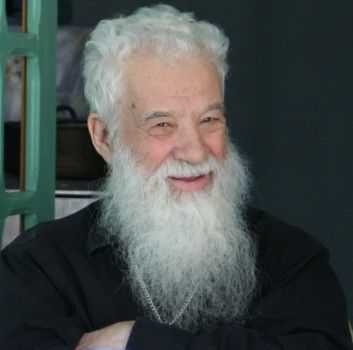
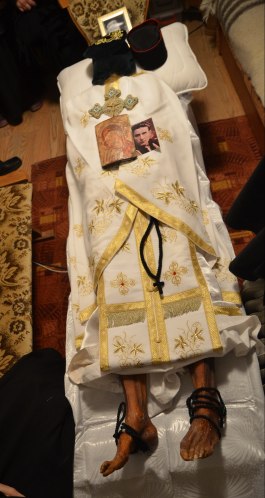
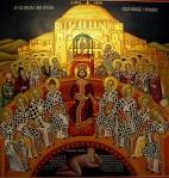 Christian Dogma
Christian Dogma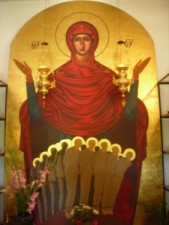 Christian Martyrs
Christian Martyrs Christian Orthodox Churches and Monasteries
Christian Orthodox Churches and Monasteries Christian Sermons and News
Christian Sermons and News Church's Teachings on Fasting
Church's Teachings on Fasting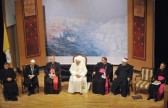 Ecumenism – a Great Heresy
Ecumenism – a Great Heresy Father George Calciu
Father George Calciu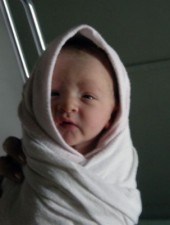 Life_a Sacred Gift form God
Life_a Sacred Gift form God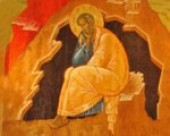 Orthodox Saints and Church Fathers
Orthodox Saints and Church Fathers Spiritual Elders
Spiritual Elders Daily Bible Readings
Daily Bible Readings Journey to Orthodoxy
Journey to Orthodoxy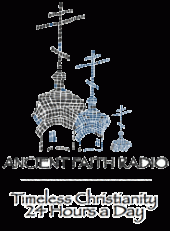 Listen to Ancient Faith Radio
Listen to Ancient Faith Radio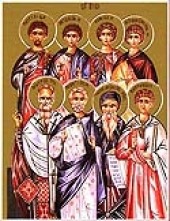 Orthodox Calendar of Feasts and Saints
Orthodox Calendar of Feasts and Saints Orthodox Christian Mission Center
Orthodox Christian Mission Center Orthodox Institute
Orthodox Institute OrthodoxChristianNetwork TV
OrthodoxChristianNetwork TV
Recent Comments